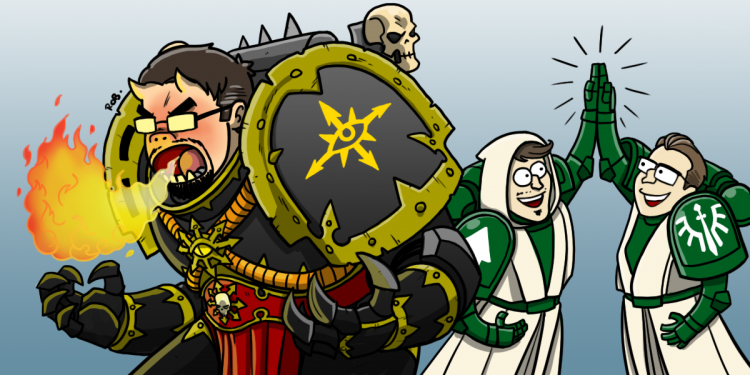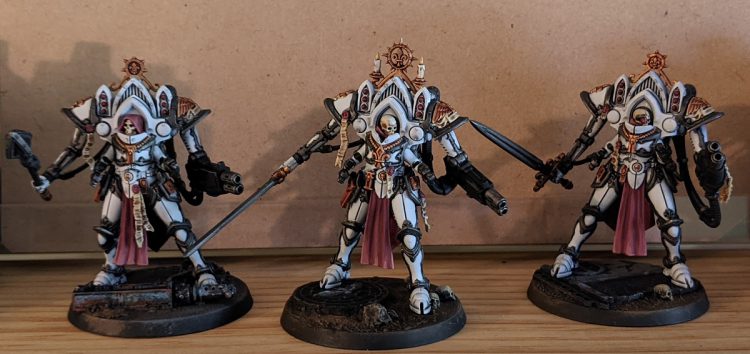Games Workshop released another FAQ/Errata document Friday, this one answering your burning questions about the Book of Fire.
Or at least, that’s what it claimed to do. In reality, this was another in a series of underwhelming FAQ documents that doesn’t really answer any of the questions that are being frequently asked. And believe me, here at Goonhammer, we know what questions you’re asking. Our inbox is so full of them that Vre’Kais, the author of our Ruleshammer column, is really only limited by the amount of time he can devote to answering them in between his other obligations.
So what’s going on here? And why is Rob constantly breathing fire over the fact that these documents are getting published without answers to questions that are being asked more or less constantly?

What are “the FAQs”?
While we generally refer to these documents as “the FAQs,” they are in fact two separate documents combined into one for publication: the “Updates & Errata,” which provides an errata sheet to the rules document it’s modifying, and a list of “Frequently Asked Questions” with answers. These documents serve different purposes, so we’ll discuss them separately.
The errata sheet’s goal is to deliver substantive changes to the rules of the game, either because they are considered to be poorly balanced or because the text on the page says something other than what was intended.
In terms of the former, let’s look at the Adeptus Mechanicus errata sheet as an example: there was no question when that book launched how Enriched Rounds worked. The stratagem couldn’t have been written more clearly. The debate about that stratagem was instead whether that clearly-stated rule should stand as written. After the codex was in the wild for a bit and some actual data was gathered, GW released the errata sheet, which changed how the rule worked.
In the latter case, we can refer to the Adepta Sororitas, and the infamous Paragon Warsuits who both ignored damage 1 entirely but also cost 240pts per model. Like the Ad Mech example, the rules as they were on the page were completely clear – but these were errors which had crept in by careless editing of the printed text, and so that text was corrected accordingly in the errata.

The goal of the FAQ section is different – these are questions about how the rules work that players are, presumably, asking frequently enough to merit an explanation. Looking back at the Ad Mech document, this time at the FAQs section, we see a single question: whether the “cap” of 6 mortal wounds on the Wrath of Mars strat applies to the stratagem as a whole, or to each individual model in a unit it affects. As written, the rule is somewhat ambiguous, and making the clarification doesn’t so much correct an error in the rule itself as it helps ensure that players will be applying that rule in a consistent and fair manner.
In other words, these two parts of the document are solving two entirely separate problems. The errata sheet is addressing things in the game where the rules, played correctly, create an unintended outcome – either because there is an error in the printed text, or because the experience of the rule in the wild shows that it is substantially more (or, less often, substantially less) powerful than it was intended to be, and causes a negative play experience which can only be amended by changing the rule itself to work differently. These are solutions to situations where everyone involved – from the rules team to the tournament organizers to the player base at large – agrees on what the rule actually says, and any disagreement is confined to whether that rule is good for the game as written.

FAQs, on the other hand, address questions of interpretation, or, in other words, what the rules mean. The goal of an FAQ section is (or ought to be, anyway) to create clarity in the rules team’s intent and make sure that players are equipped to play the game correctly, and that that experience is consistent regardless of where you happen to be playing.
Why do we want more answers?
Simple: because these are genuine questions which deserve genuine answers, and because in a game as complicated as 40k there are bound to be edge cases or interactions where there is some amount of ambiguity which needs to be resolved. It’s absurd that we had to wait until some enterprising player took a Sisters of Battle list to a tournament that happened to be overseen by Games Workshop to get something approximating an “official” stance on whether you can use two Armourium Cherubs on the same squad of Retributors in a single round (the answer, as it turns out, is that you can’t). And the fact that they apparently had the answer ready to go so that it could be announced on stream at the event shows that they know it’s an issue, making their refusal to just write it down even more baffling. And this isn’t even the only question that we only found out that Games Workshop has ruled on through the Orlando GT – various other rules questions were answered on the stream, and now the only official confirmation of those answers is that a guy watching the stream remembers what they were, when they could easily have been written down and made available to everyone.
But a good FAQ document doesn’t only answer questions as they come up – it also gives valuable insight into what thoughts are going through the rules team’s heads as they write and review their rules. Sooner or later, every TO will be faced with some would-be angle-shooting jerk who thinks they’ve found One Simple Trick The Rules Team Doesn’t Want You To Know. These “strategies” nearly uniformly rely on areas of the rules where GW hasn’t yet spoken ex cathedra and given clarity.
The more information we’ve got about what the rules team is thinking, the easier it is for TOs and players to make educated guesses at what their intent really is. For an example, let’s look at a recent Ruleshammer column on the Orks codex. At the end of that article, Vre’Kais looks at how the Brutal but Kunnin’ warlord trait interacts with the Goffs’ No Mukkin’ About Clan Kultur, an interaction for which at the time of writing this article there remains no clarification that directly addresses the point. However, rather than throwing up his hands and saying we have to wait for clarification, Kais points to two previous answers in FAQ documents dealing with additional hits and additional attacks. Because these previous rulings make clear that those additional hits are treated as normal attacks and that additional attacks can’t generate more additional attacks themselves, he eventually decides that the best way to harmonize these rulings is to play it so that the extra hits from No Mukkin’ About don’t trigger additional attacks from Brutal but Kunnin’ if they don’t result in damage.

This “ruling” isn’t gospel, and you’re obviously not required to follow it. However, it’s a great example of how the value of an FAQ goes beyond just answering the question itself – it gives us something to ground future decisions in. In the case of the Orks codex, the fact that GW hasn’t yet ruled on these things isn’t unexpected – somewhere from 1-2 months after the codex is probably about when we can expect them to have gathered enough external information and had enough internal discussion to come up with reasonable rulings, and we’re still less than a month from the Codex’s initial release. But thanks to prior rulings issued in other, unrelated FAQ documents, Kais was able to come up with a reasonable and – perhaps more importantly – defensible interpretation of how those rules interact with one another in a way that keeps the spirit of both rules alive while mitigating the possibility of unleashing another Competitive Edge/Razorflails combo on the meta. If you’re a tournament organiser, being able to use this same kind of reasoning to inform the rulings you’re making at your event is invaluable – you might not always get the correct answer as GW eventually ends up giving it (assuming they do at all), but at least you can explain what your reasons are for arriving at the decision you did.
What’s going on here?
So the question is: why are these frequently-asked questions not finding their way into the lists of Frequently Asked Questions? It’s clear from the Orlando GT that GW is aware of at least some of them, and I seriously doubt that there are many issues at all that have entirely escaped their notice.
The way I see it, there are a handful of reasons why GW might not answer a particular rules question. First, they might have just not worked out what their answer is for it yet. If that’s the case, that’s fine, though once they do work it out it would be helpful if they published it rather than Saving That Shit For Nationals. Second, the more questions that are contained in an online document, the more stuff players have to read before they’re able to play the game. But if this is their concern, then it’s odd that their recent FAQ/Errata documents are heavy on the errata and light on the FAQs, since FAQs are – by definition, even – more likely to contain answers to questions that will be asked during gameplay, where errata are just changes to the rules that aren’t reflected in the published book.
The other possibilities here are somewhat less convincing, though. One potential justification for this hesitation to publish FAQs is a fear of getting it wrong and having to change it again later. After all, there’s nothing more frustrating than waking up to a complete change in how your army works. But the major advantage of even having a digital rules supplement in the first place is that you can change it relatively seamlessly. In other words, if they make a bad call and it needs to be changed again later, they can do so. We saw exactly this happen with the Look Out, Sir! Rule, which received an errata last year which accidentally made it so smaller vehicles were unable to protect characters for no particularly good reason, and was swiftly corrected to work more sensibly.
They might also be concerned that answering these questions would empower bad actors to create new and exciting edge cases that they could use to achieve unearned wins over innocent beginners and other less-confident players. If this is the case, though, they’ve got it exactly backwards: answering these questions actually empowers those beginning players to stand up to people who are trying to get away with something by giving clear and unambiguous guidance on how a rule is applied. The fact that a lot of these questions are asked as a result of interactions with less-than-ethical players is more reason to answer them promptly, not less.

Even more concerning, though, is another potential explanation: maybe they just think the rules are clear enough as currently written. If this is the case, the rules team is completely missing the point. It doesn’t matter whether the rules team thinks they’ve written rules that are not ambiguous. Hell, it doesn’t even matter if the rules are in fact unambiguous. The only thing that matters here is whether the questions being answered are, in fact, frequently asked. Every time some edge-shooter does something unexpected, there’s the possibility that, in the absence of guidance from on high, they’re going to get away with it. The fact that these questions are being asked a lot means that someone either thinks that the answer could come down either way, or that they could trick someone into thinking it could come down either way. Whichever the reason, the only way we’re going to get clarity is if they’re answered.
Finally, this might be part of an actual strategy to wrap up all of the “non-emergency” FAQs and errata into the two big FAQs. As just one example, the last “Big FAQ” included a new entry in the Rare Rules section that was pretty clearly intended to address one specific issue with the Tome of Malcador. This is a fantastic idea when dealing with errata – the fewer revisions there are to the actual rulebook, the better – but a terrible one when dealing with questions of interpretation. After all, the FAQ answers aren’t changing the rules so much as they’re telling you what those rules actually mean. Delaying answering these questions doesn’t actually get them much, and comes with the potential of overruling now long-standing house rules that were put in place as a stop-gap to deal with areas where the rules aren’t as clear as they could be.
What can they do?
I can understand GW’s hesitancy to create a large FAQ document. Buying the Core Rules, your Codex, a mission pack or two, and maybe a campaign book will add up to a significant investment in rules alone, and the more other sources you have to go to to find the “real” rules, the harder it is to justify that investment to a certain segment of the player base.
But we’re all human, from the rules team, who are going to make mistakes, to tournament organizers, who are going to misinterpret the rules team’s intent given incomplete information, down to the players, some of whom will make mistakes and misread or misunderstand a rule, while others will try to push some completely out-there misreading so that they can try to win games on a “gotcha.”
All of these problems can be mitigated with a simple solution:
Answer the fucking questions.
It’s not perfect, and it’s not going to solve every problem with the game, but the more guidance we get from the rules team on how the game is intended to be played, the more likely it is that we will be playing that game. And if GW wants to avoid TOs and other members of the community taking balance and errata into their own hands – a result that could fracture the tournament scene and destroy a lot of the benefits that have come from the changes in approach with 9th that GW has worked so hard to implement – then they’re going to have to suck it up and start actually answering questions.
At the end of the day, there comes a point where certainty in the ruling is more important than getting it “right”. If a rule doesn’t make sense, change it later. But make a ruling so that players know what to expect, and so that TOs are better equipped to handle edge cases and bad-faith players.
Quit FAQing Around
Writing the rules for 40k is unquestionably hard, and the work the rules team has put into the game is impressive. However, the move away from regularly answering questions that come up in games – as was done routinely in 8th edition – is, in our view, a poor decision. If Games Workshop is serious about creating a game that will be fun at all levels of play for as long as possible, then they need to start actively soliciting questions from the community and publishing the answers more than once or twice a year. After all, nobody wants the actual most frequently-asked question to be “Why can’t we get any answers?”
Have any questions or feedback? Drop us a note in the comments below or email us at contact@goonhammer.com.


